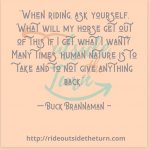lme
Well-Known Member
I do think things are changing. I’ve never really liked to ride with a whip or spurs and hate flashes, harsh bits etc. In the past I have felt out of step. These days less do. I am enjoying doing exactly what I want with my horses. Which is often a gentle hack round the lanes or a walk in hand. Young horse doesn’t mind at all. She’s slowly getting stronger and fitter and horses don’t care if they are ‘behind’ their peers.

